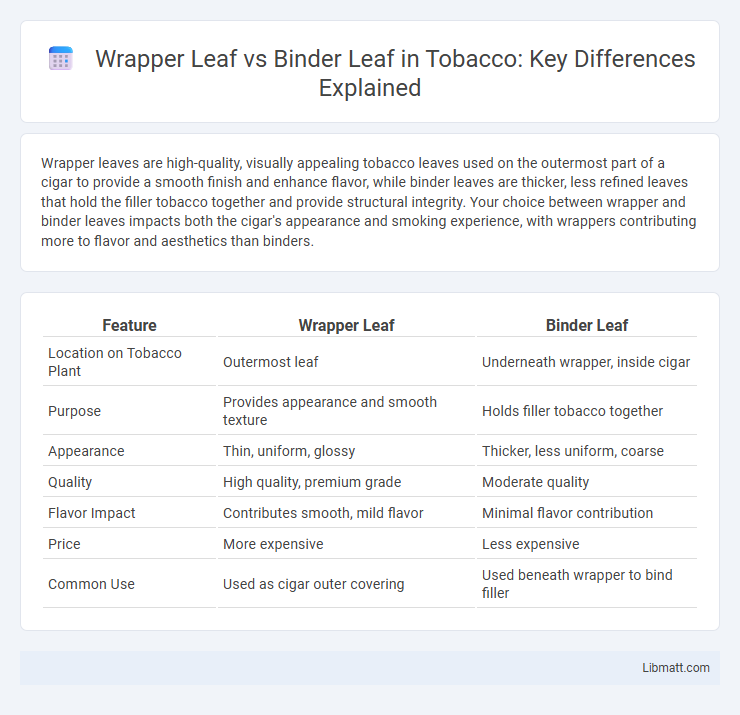Wrapper leaves are high-quality, visually appealing tobacco leaves used on the outermost part of a cigar to provide a smooth finish and enhance flavor, while binder leaves are thicker, less refined leaves that hold the filler tobacco together and provide structural integrity. Your choice between wrapper and binder leaves impacts both the cigar's appearance and smoking experience, with wrappers contributing more to flavor and aesthetics than binders.
Table of Comparison
| Feature | Wrapper Leaf | Binder Leaf |
|---|---|---|
| Location on Tobacco Plant | Outermost leaf | Underneath wrapper, inside cigar |
| Purpose | Provides appearance and smooth texture | Holds filler tobacco together |
| Appearance | Thin, uniform, glossy | Thicker, less uniform, coarse |
| Quality | High quality, premium grade | Moderate quality |
| Flavor Impact | Contributes smooth, mild flavor | Minimal flavor contribution |
| Price | More expensive | Less expensive |
| Common Use | Used as cigar outer covering | Used beneath wrapper to bind filler |
Understanding Wrapper Leaf and Binder Leaf
The wrapper leaf is the outermost leaf of a cigar, providing the primary visual appeal, smooth texture, and contributing significantly to flavor due to its high-quality tobacco. The binder leaf lies beneath the wrapper and plays a crucial role in holding the filler tobacco together, offering structural integrity and influencing the cigar's burn and draw. Both wrapper and binder leaves are carefully selected for their specific characteristics to enhance the overall smoking experience.
Key Roles: Wrapper vs Binder in Cigar Construction
The wrapper leaf is the outermost layer of a cigar, primarily responsible for its aesthetic appeal, flavor profile, and smoothness, often made from high-quality, visually flawless tobacco leaves. The binder leaf lies beneath the wrapper, providing structural integrity and holding the filler tobaccos together, ensuring an even burn and proper airflow throughout the cigar. Both leaves play essential roles in the cigar's construction, affecting the overall smoking experience through flavor balance and physical stability.
Characteristics of Wrapper Leaves
Wrapper leaves in cigar construction are known for their smooth texture, consistent color, and oily sheen, which significantly impact the cigar's aesthetic appeal and flavor profile. These leaves are carefully selected for their elasticity and durability to ensure a tight, flawless roll, while contributing subtle flavors such as spice, sweetness, or earthiness. In contrast, binder leaves are thicker and more porous, designed to hold the filler tobacco together rather than provide flavor or appearance.
Characteristics of Binder Leaves
Binder leaves are thicker and more elastic compared to wrapper leaves, providing structural support to the cigar's filler. Their texture is less smooth and less visually appealing than wrapper leaves, making them unsuitable for the outermost layer but essential for maintaining the cigar's shape. Binder leaves have a higher oil content, which contributes to a better burn and enhanced flavor release during smoking.
Leaf Selection: Quality and Appearance
Wrapper leaves are selected for their exceptional quality, smooth texture, and flawless appearance, as they directly impact the cigar's aesthetic and burn consistency. Binder leaves, while still requiring strength and pliability, are chosen primarily for their durability and ability to hold the filler tobacco tightly without needing to be as visually perfect. The difference in leaf selection criteria ensures that wrappers provide optimal visual appeal and flavor, whereas binders offer structural support and consistent combustion.
Impact on Flavor: Wrapper vs Binder
Wrapper leaves, being thinner and more delicate, significantly influence the cigar's flavor by imparting distinct aromas and enhancing the overall taste profile. Binder leaves, thicker and less refined, primarily provide structural support but contribute subtle, earthier undertones that complement the wrapper's flavor notes. The interaction between wrapper and binder leaves determines the cigar's complexity, balancing aromatic richness with foundational depth.
Contribution to Combustion and Burn
Wrapper leaves contribute significantly to combustion by providing a smooth, airtight surface that burns evenly and slowly, enhancing the overall burn quality of cigars. Binder leaves, positioned beneath the wrapper, play a crucial role in maintaining structural integrity and promoting optimal airflow, which helps sustain a consistent burn. Understanding the distinct combustion properties of the wrapper and binder leaves can improve Your appreciation of cigar construction and smoking experience.
Popular Tobacco Varieties for Wrappers and Binders
Connecticut Shade and Habano are popular tobacco varieties used for wrapper leaves due to their smooth texture and appealing appearance, which enhance a cigar's flavor and burn quality. For binder leaves, varieties like Maduro and Mata Fina are preferred for their strength and elasticity, providing structural integrity without overpowering the cigar's overall taste. The choice of wrapper and binder tobacco significantly influences the cigar's complexity and smoking experience.
Processing Differences: Wrapper vs Binder Leaf
Wrapper leaves undergo meticulous selection and curing to achieve a smooth, thin, and visually appealing texture, ideal for the outermost layer of cigars. Binder leaves are processed to be more elastic and thicker, providing structural strength to hold the filler tobacco firmly in place during cigar rolling. Your choice between wrapper and binder leaves influences the final cigar's appearance, burn quality, and overall smoking experience.
Choosing the Right Leaf for Cigar Making
Selecting the right leaf is crucial in cigar making, where wrapper leaves provide the outermost appearance and flavor, significantly impacting the cigar's aroma and aesthetics. Binder leaves, which are thicker and more elastic, hold the filler tobacco together, influencing the cigar's burn and draw quality. Understanding the distinct roles of wrapper and binder leaves ensures a balanced construction, optimizing both the visual appeal and smoking experience of the cigar.
wrapper leaf vs binder leaf Infographic

 libmatt.com
libmatt.com